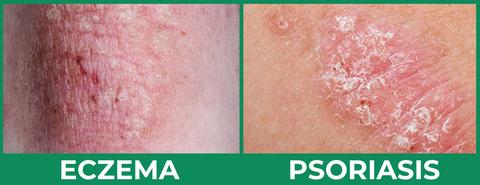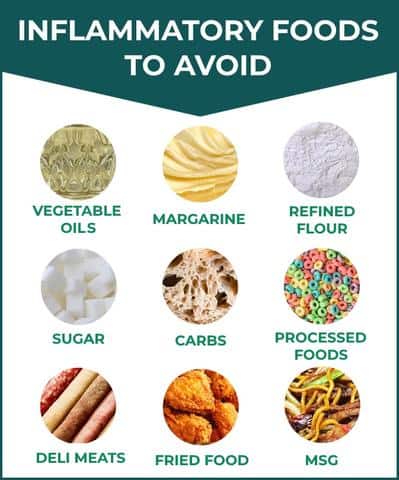After our most recent podcast, I felt it was time to address three common rashes people deal with that are not poison ivy.
Eczema and psoriasis are two skin conditions that manifest as a red, raised, and often-times itchy rash. There’s overlap between them, but they are generally VERY different conditions.
In this article, we talk about the differences between the two skin conditions and then talk about how we can use natural remedies and true holistic care to regain control of the problem.
How I Approach Skin Conditions
I’m a pharmacist with an advanced, clinical degree focusing on therapeutics and treatment algorithms on top of our drug expertise. For skin health, we had our school training and continuing education, plus I’ve had a decade and a half of looking at people’s skin, as pharmacists are the most accessible healthcare professionals.
I will tell you, in my normal no-BS manner, that I am the biggest dope when it comes to identifying skin problems.
As we’ll see in the next section, diagnosing one of these conditions requires more data than a glance at the skin. I don’t think enough ‘practitioners’ identify that they are not dermatologists, and therefore are not an expert in managing skin problems.
My approach, which you should adopt as your approach, is “that’s a rash, and we don’t really know what kind of rash.” We can all spitball, but we should seek conventional experts to identify the specific situation, so we can then treat it accordingly and efficiently.
Here’s what we all CAN do as it pertains to uncertainty around a rash: manage everything we can control that could make any rash or condition causing a rash worse. Then, when we do consult with a dermatologist, we can proudly say we’ve minimized all the variables that could contribute to the condition.
Before we get into that, let’s talk briefly about the differences between eczema, dermatitis, and psoriasis.
The Differences Between Eczema, Psoriasis, and Dermatitis
Each of these skin conditions will produce red, itchy, and raised skin, but the causes and treatments vary greatly.

Let’s start with dermatitis. Dermatitis is a word that’s confused with eczema and psoriasis. Dermatitis is a general descriptor for inflammation or irritation of the skin. Eczema is a type of dermatitis, called atopic dermatitis. The more common form is contact dermatitis, which is your skin reacting to something it touched, like poison ivy.
The Causes of Eczema and Psoriasis
Eczema is generally caused by a combination of genetic and/or environmental factors. This includes diet, allergies, dry climates, urban-dwelling (pollutant exposure), and more. Some people have a weak protective layer of skin due to a gene mutation.
Psoriasis is an autoimmune disease that causes skin cells to grow too fast, which leads to thickened, white scaly skin.
The Locations of Eczema and Psoriasis Rashes
Another common difference is where the rashes are generally found.
Eczema is most commonly found in your ‘pits,’ like behind your knees or the inside part of your elbows.
Psoriasis is found on the outsides and at the extremes: face, butt cheeks, knees, elbows, and scalp. Eczema could be found in those areas, too, and that’s why an expert is needed to further diagnose it.
The Itch Factor
Another subtle difference between eczema and psoriasis is in the itchiness.
Eczema causes a very intense itch, which some scratch so hard it breaks the skin and becomes a wound to manage.
Psoriasis tends to be less itchy but can lead to a burn.
Fun (or not) in the Sun
Patients with eczema tend to be more heat-sensitive, plus sweat can increase flare-ups.
Psoriasis can be managed with UV light, as it can slow the excess growth of skin.
No matter what, sunburns suck, and doubly so for those with skin conditions.
Holistic Management for Eczema and Psoriasis
Is it eczema? Is it psoriasis? Yes, we absolutely have to find out for certain, but only a doctor can tell you that.
We can’t go out on our own and try to use a number of supplements or alternative remedies, blindly swinging vine to vine, hoping we luck out and find something that finally works.
The proper, honest, and holistically-minded approach for managing these skin conditions is “what factors are contributing to the worsening of my skin condition, and how do I control them to minimize their effect?”
These three thoughts should sound familiar to regular followers of my nonsense advice.
It should be no surprise to you that my recommended approach for managing these conditions is to follow the Wellness Pyramid model. It’s consistent, it’s comprehensive, and by climbing that pyramid, we can help both our skin AND our overall wellness.
It’s All About Inflammation
Eczema and psoriasis can both be worsened by diseases and life choices that contribute to a higher state of inflammation in our bodies. Lucky for you, we’ve talked about inflammation on our podcast and blog.
We must have tight nutritional control of inflammation, avoiding inflammatory foods, and eating anti-inflammatory foods. We must get rest, as sleep has a general anti-inflammatory effect. We have to control environmental factors: chemical/pollution exposure or air quality, water quality, allergens, climate, and more. Regular exercise is vital to help reduce inflammation.
On the disease front, we have to manage our metabolic diseases. Obesity increases inflammation directly. High blood pressure, diabetes, or high cholesterol lead to a general inflammation imbalance. Therefore, skipping medications because “drugs are bad, mkay” is unwise. Get those numbers to target range, and use the medicines which often have their own anti-inflammatory effect.
Nutrition that Helps Eczema and Psoriasis
Inflammatory foods to avoid:
- Vegetable oils, margarines, trans fats
- Refined flours, sugar, and simple carb-rich foods
- Processed or packaged foods
- Deli meats, fried foods, and MSG-rich foods

Avoid dehydration and things that can increase dehydration like caffeine and alcohol.
Anti-inflammatory foods to consume:
- Dark, leafy greens
- Healthy fats like fatty fish, avocado, real olive oil, coconut oil, and even butter
- Complex carbohydrate-rich foods like fruits and vegetables
Stay hydrated by drinking about half your body weight in ounces (with a minimum of 64 ounces).
Foods rich in zinc will contribute to healthy skin. Oysters, chicken, beef, tofu, hemp seeds, lentils, oatmeal, eggs, and nuts like almonds are cashews are a must.
Collagen-rich foods like bone broth or organ meats are great, and proteins, in general, will help ensure you have healthy hair, skin, and nails.
Lastly, a few foods have direct anti-inflammatory effects and should be a part of everyday life for those suffering from skin conditions
- Pineapples
- Cherries
- Blueberries, raspberries, etc
The Vital Five for Eczema and Psoriasis
Supplements must be used strategically and based on science. There are five nutrients we believe almost everyone would benefit from, called the Vital Five. Many of those contribute to healthy skin and can help combat things that lead to eczema and psoriasis.
The Vital Five for Eczema and Psoriasis are:
- Omega-3: Shoot for 3000mg of EPA and DHA, from fish oil or algae if you are vegan
- Probiotics: Support your GI tract and help reduce gut inflammation with a well-made probiotic
- Bone Support: Calcium has a tiny role here, but Vitamin D is a must. Follow our guidelines in our Vitamin D article.
- Protein: As we said above, a protein-rich diet is a must, but some of us can’t reach our goals of about half our weight in grams of protein daily.
- Micronutrients: Using zinc at 30mg or less or biotin at 5000mg, in some trials, has been shown to support healthy skin
Better Skin Care Options
We want to treat our skin well, so getting rid of harsh products is our first step. Using fragrance-free detergents, dish soaps, and body wash is important.
We want to moisturize our skin, so finding a great cream is a priority. We recommend a hemp-based moisturizer, as hemp has natural anti-inflammatory compounds in it.
There are countless creams, lotions, and ointments with both medications and supplements in them that are marketed to help with eczema or psoriasis. So much so, that they deserve their own post. In this arena, it takes experimentation.
I generally recommend colloidal oatmeal-based products. CBD-based creams are my absolute favorite right now for anything superficial on the skin. My patients get more dramatic results with these two options over things like calendula, menthol/camphor, and others.
After the Heavy Lifting
Our advice is often to make the lifestyle changes and introduce the Vital Five products first. After a period of 45-60 days, we’ll see the impact these modifications will make.
We’re not thinking these will be miracle cures, but instead we’re doing the heavy lifting around healthy choices to make sure the lack of nutrients isn’t causing our problem.
After this, we can move to our next rung of supplement options:
- Regenerate Plus is a high dose biotin with a special, bioavailable silica, both which support healthy skin
- GI Immune is an immunoglobulin that supports a healthy immune response from the inside out
- I generally do NOT recommend Vitamin E, but whole food sources like wheat germ can potentially help with healthy skin
Climbing the Pyramid to Skin Success
We follow the above recommendations to eliminate factors contributing to our skin conditions that we have direct control over.
By doing so, we allow our doctors to focus on what they should—the part that’s not responding to our lifestyle choices.
To best manage, minimize, or attempt to prevent eczema and psoriasis, start with healthy anti-inflammatory food choices, hydration, sleep, exercise, and control of environmental factors such as pollution exposure, dry air, and allergens.
Then, care for your skin as best as you can with fragrance and chemical-free moisturizers.
We probably will have to climb to the summit of the Wellness Pyramid to properly manage eczema and psoriasis, speaking to a doctor for prescription creams or even internal medicine like biological products to blunt the autoimmune aspect, for example. And that’s OK. It doesn’t mean our efforts are for naught, it just means we’ve done all we can.
Just trying to keep it real…

Neal Smoller, PharmD
Owner, Pharmacist, Big Mouth



